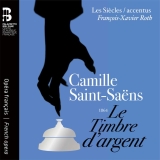 Camille Saint-Saëns: Le Timbre d’Argent; Jodie Devos (Rosa), Tassis Christoyannis (Spiridion), Hélène Guilmette (Hélène), Edgaras Montvidas (Conrad), Yu Shao (Benedict), Raphaëlle Delaunay (Circée), Les Siècles, Accentus, François-Xavier Roth; 2 CDs Bru Zane BZ1041; Aufnahme 06/2017, Veröffentlichung 28/08/2020 (F, UK, US), 03/08/2020 (D) - (147') - Rezension von Norbert Tischer
Camille Saint-Saëns: Le Timbre d’Argent; Jodie Devos (Rosa), Tassis Christoyannis (Spiridion), Hélène Guilmette (Hélène), Edgaras Montvidas (Conrad), Yu Shao (Benedict), Raphaëlle Delaunay (Circée), Les Siècles, Accentus, François-Xavier Roth; 2 CDs Bru Zane BZ1041; Aufnahme 06/2017, Veröffentlichung 28/08/2020 (F, UK, US), 03/08/2020 (D) - (147') - Rezension von Norbert Tischer

Le Timbre d’Argent ist eine ganz ausgezeichnete, leider weitgehend unbekannte Oper von Camille Saint-Saëns. Sie wurde 1877 im Théâtre National Lyrique in Paris uraufgeführt. Der Titel kommt von einer Klingel, mit ihrem silbernen Klang (Timbre d’Argent). Sie schenkt denjenigen, die sie bedienen, haufenweise Gold, verursacht aber auch den plötzlichen Tod einer nahestehenden Person… Ein böses Wesen, Spiridion, ein entfernter Verwandter Mephistos, zieht die Fäden in dieser seltsamen Affäre. Der Maler Conrad verliebt sich in sein Modell, eine Ballerina, die Hauptfigur, die nicht singt. Verzehrt von Armut und Finsternis, gibt sich Conrad in einer Weihnachtsnacht einem delirierenden Fieber nach. Fällt er dann dem Teufel oder einem Alptraum zum Opfer? Tatsache bleibt, dass die magische silberne Glocke, ihn dazu bringt, Kunst und Wirklichkeit zu verwechseln, und ihn zu schrecklichen Übertretungen treibt. In Wirklichkeit ist alles nur ein Albtraum, und der Maler wird den wahren Sinn des Lebens erkennen und diejenige heiraten können, die ihn liebt, Hélène.
Dieses von den Librettisten von Faust und Les Contes d’Hoffmann erdachte Drama erlaubte es dem Komponisten, seine eigene Version des faustischen Paktes zu schreiben, eine wahre ‘opéra fantastique’. Doch dem Werk war kein dauernder Erfolg beschieden. Le Timbre d’Argent geriet in Vergessenheit.
Die Oper beginnt mit einer 12 Minuten langen, dramatischen sowie musikalisch sehr attraktiven Ouvertüre und enthält wunderbare Arien, Szenen und Chöre, die in der zupackenden, beschwingten Interpretation von Xavier-François Roth bestens zur Geltung kommen.
Die Besetzung ist exzellent. In der romantisch-lyrischen Rolle des Conrad ist Edgaras Montvidas ein hervorragend gestaltender Sänger mit einer angenehmen Stimme. Als Hélène ist Hélène Guilmette eine ebenso gute Besetzung. In der Rolle von Spiridion bietet Tassis Christoyannis eine stimmlich prächtige, darstellerisch diabolische Interpretation.
Die Figuren von Benedikt und Rosa werden von dem lyrischen Tenor Yu Shao und der reizenden Sopranistin Jodie Devos sehr attraktiv gesungen.
Unter Roths inspirierender und dynamischer Leitung spielt das Orchestre Les Siècles mit viel Impetus, und der Chor Accentus ist ein weiterer Pluspunkt der empfehlenswerten Erstaufnahme dieser hoch interessanten Oper.
Le Timbre d’Argent is an excellent, unfortunately largely unknown opera by Camille Saint-Saëns. It was first performed in 1877 at the Théâtre National Lyrique in Paris. The title comes from a bell with its silver sound (Timbre d’Argent). It gives heaps of gold to those who use it, but also causes the sudden death of a close person… An evil being, Spiridion, a distant cousin of Mephisto, pulls the strings in this strange affair. The painter Conrad falls in love with his model, a ballerina, a character who does not sing. Consumed by poverty and darkness, Conrad gives in to a raging fever during Christmas night. Does he then fall victim to the devil or a nightmare? The fact is that the magical silver bell causes him to confuse art and reality and drives him to terrible transgressions. In reality, everything is just a nightmare, and the painter will be able to see the true meaning of life and marry the one who loves him, Hélène.
This drama, conceived by the librettists of Faust and Les Contes d’Hoffmann, allowed the composer to write his own version of the Faustian Pact, a really fantastic opera. But the work was not a lasting success and Le Timbre d’Argent fell into oblivion.
The opera begins with a 12-minute long, dramatic and musically very attractive overture and contains wonderful arias, scenes and choruses, which are shown to their best advantage in the gripping, lively interpretation by Xavier-François Roth.
The instrumentation is excellent. In the romantic-lyrical role of Conrad, Edgaras Montvidas is an outstanding singer-actor with a pleasant voice. As Hélène, Hélène Guilmette is an equally good cast. In the role of Spiridion Tassis Christoyannis offers a vocally splendid and dramatically diabolic interpretation.
The characters of Benedict and Rosa are sung very attractively by the lyrical tenor Yu Shao and the lovely soprano Jodie Devos.
Under Roth’s inspiring and dynamic direction, the Orchestre Les Siècles plays with great impetus, and the choir Accentus is another plus in the highly recommended first recording of this highly interesting opera.
























